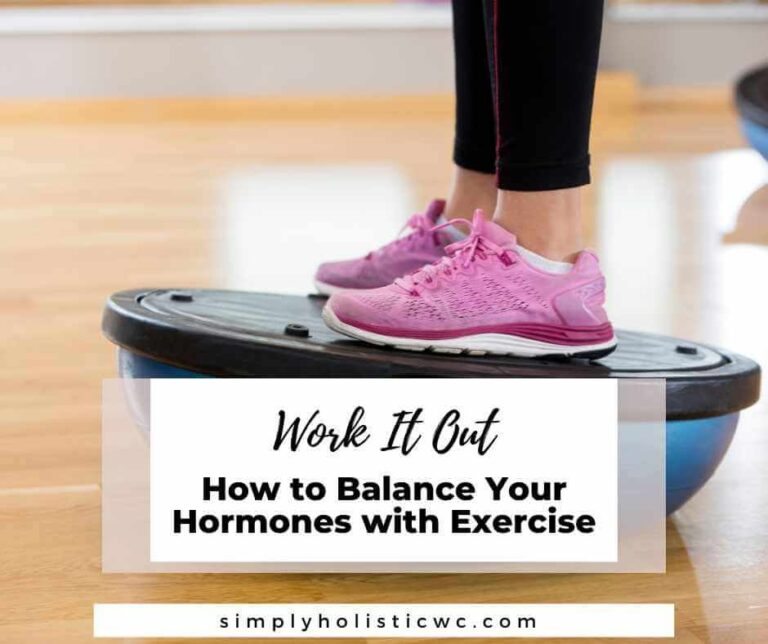The Ultimate Holistic PCOS Weight Loss Plan

Are you a woman dealing with PCOS and trying to lose weight? If so, know that you’re not alone.
Going through PCOS can feel incredibly tough – especially when it comes to shedding extra pounds.
But there is hope!
A holistic approach to managing your condition and attaining a healthy weight could be the key to getting the results you’re looking for.
In this blog post, we’ll cover why taking a holistic approach specifically tailored to women with PCOS can get you on track for your ultimate goal of weight loss success!
Find out what you need to know about crafting an effective plan that works for YOU.
This post may contain affiliate links for which I may earn a small commission. This means shopping through these links supports my blog at no cost to you. Please read my full policy. Thank you!
What is PCOS?
Polycystic Ovary Syndrome (PCOS) is a hormonal disorder that affects millions of women of reproductive age worldwide.
It’s a common condition that can cause various symptoms, from irregular periods to weight gain and infertility.
PCOS is marked by elevated levels of male hormones, or androgens, which can lead to the growth of cysts on the ovaries.
Here are some of the most common symptoms of PCOS:
- Irregular menstrual cycles
- Excess hair growth (hirsutism)
- Acne
- Weight gain
- Difficulty losing weight
- Infertility
- Mood swings
PCOS can also have a range of effects on the body, including:
- Increased risk of type 2 diabetes
- High blood pressure
- Abnormal cholesterol levels
- Sleep apnea
- Depression and anxiety
While the exact causes of PCOS are still not fully understood, it’s thought to be related to insulin resistance and hormonal imbalance.
Treatment for PCOS usually involves lifestyle changes like diet, exercise, and medication to regulate hormones and manage symptoms.
If you’re experiencing any PCOS symptoms, it’s important to talk to your healthcare provider to get a proper diagnosis.
With the right support and guidance, you can manage PCOS and live a happy, healthy life.
You May Also Enjoy:
The Natural Approach: 11 Tips to Get Pregnant with PCOS

How Can PCOS Make Weight Loss Difficult?
If you’re one of the millions of women living with PCOS, you know it can be a real struggle to lose weight.
But why is that?
Here are a few ways that PCOS can make weight loss difficult:
1. Insulin resistance
Many women with PCOS have insulin resistance, which means their bodies have trouble using insulin effectively to regulate blood sugar levels.
This can lead to weight gain, particularly around the midsection.
2. Hormonal imbalances
PCOS can cause imbalances in hormones like estrogen and testosterone, affecting metabolism and making it harder to lose body weight.
3. Increased appetite
Some studies have suggested that women with PCOS may have an increased appetite or a tendency to crave high-carb, high-fat foods, making it tough to stick to a healthy diet.
Despite these challenges, it’s important to remember that weight loss is still possible with PCOS.

We’ll look at some ways you can use a holistic approach to lose weight with PCOS next!
A Holistic Approach to Losing Weight with PCOS
When it comes to weight management with PCOS, the best way is to take a holistic approach!
This means considering not just your diet and exercise habits but also your mental and emotional well-being and any underlying health conditions that may be affecting your weight.
By taking a whole-person approach to weight loss, you can promote sustainable, long-term success and improve your general health and happiness.
In this section, we’ll look at some key elements of a holistic approach to losing weight with PCOS and offer some tips and strategies for getting started!
Before we dive into our tips and strategies for losing weight with PCOS, it’s important to note that this information isn’t intended as medical advice.
If you suspect that you may have PCOS or are experiencing any concerning symptoms, it’s important to seek out professional medical advice for a proper diagnosis or before making any major lifestyle changes.
1. Eat a Balanced, Healthy Diet
When it comes to losing weight with PCOS, nutrition is key.
By focusing on nourishing whole foods and avoiding highly processed, sugary options, you can support your body’s natural systems and promote healthy weight loss.
There’s no “best diet” for PCOS, as everyone is unique and will respond differently to different foods.
But here are some tips and guidelines to go by to ensure you are following a balanced diet:
Healthy Fats
Incorporating healthy fats into your diet can help keep you feeling full and satisfied, which can help prevent overeating.
Healthy fats are a great source of fatty acids and can help with hormone regulation, so they’re an essential part of any PCOS diet plan.
Good sources of healthy fats include avocado, nuts and seeds, and olive oil.
Carbs and Fiber
While it’s important to be mindful of carb intake when trying to lose weight with PCOS, it’s also important to ensure you’re getting enough fiber.
Aim for plenty of leafy greens, cruciferous veggies like broccoli and cauliflower, and other high-fiber options like chia seeds and flaxseed.
Also, don’t be afraid of eating a moderate amount of unrefined carbs like quinoa, brown rice, and oats. These healthy carbs help give you energy and fuel your body!
Protein
Protein is essential for helping to maintain muscle mass as you’re losing weight.
Aim to get most of your protein from plant sources, such as nuts, seeds, and beans. But if choosing meat, choose lean protein like chicken, turkey, and fish.
Try to limit or avoid red meat and dairy products, as these can increase inflammation.
Hydration
Staying hydrated is crucial for overall health and can also help support healthy weight loss.
Aim for at least 8 to 10 glasses of water daily, and consider adding herbal teas or other no-sugar beverages for variety.
Foods to Avoid
When it comes to weight loss with polycystic ovarian syndrome, it’s best to avoid highly processed foods, sugar, artificial sweeteners, sugary drinks, and refined carbs (like white rice).
These options can spike blood sugar levels and lead to cravings and overeating, making it difficult to lose weight in a sustainable way.
You May Also Enjoy:
6 Ways A Gluten-Free Diet Is Good for PCOS
PCOS Diet: 15 Foods to Eat and 7 Foods to Avoid
31 Quick and Easy PCOS-Friendly Snack Ideas
2. Get Moving
In addition to focusing on nutrition, incorporating regular exercise into your routine can also be helpful for losing weight with PCOS.
But, it’s important to be mindful of how much and what types of physical activity you’re doing, as overdoing it can actually be detrimental to your hormones and overall health.
Here are some guidelines and tips for exercising with PCOS:
Cardio
Aim for at least 30 minutes of moderate-intensity cardio most days of the week. Good options include brisk walking, cycling, swimming, and dancing.
Strength Training
Incorporating strength training into your routine can help build muscle mass and boost metabolism, making it easier to lose weight.
Aim for at least two weekly strength training sessions, focusing on exercises that work for multiple muscle groups, like squats, lunges, push-ups, and planks.
Don’t Overdo It
While exercise is important for overall health and weight loss, it’s crucial not to overdo it.
Too much exercise can actually be stressful on the body and lead to imbalances in hormones like cortisol and estrogen.
Listen to your body and avoid pushing yourself too hard.
Variety Is Key
Mixing up your workouts can help keep things interesting and prevent burnout.
Consider trying a new class or activity or incorporating different workouts into your routine, like yoga or Pilates!
You May Also Enjoy:
18 Easy Work from Home Exercises to Stay Active
Best Home Exercise Equipment | Amazing for Weight Loss!
Work It Out: How to Balance Your Hormones with Exercise
Printable Anti-Inflammatory Foods List for Hormone Balance
3. Keep Blood Sugar Levels in Check
When living with PCOS and trying to lose weight, keeping your blood sugar levels in check is incredibly important.
This is because when blood sugar levels are too high, it can lead to reduced insulin sensitivity, making it harder to lose weight and increasing the risk of type 2 diabetes.
Here are some tips for managing blood sugar levels and supporting healthy weight loss:
Eat Regular Meals
Skipping meals or going too long without eating can cause blood sugar levels to spike and then crash, leading to cravings and overeating.
Aim to eat regular, balanced meals throughout the day to keep blood sugar levels stable.
Choose Low-Glycemic Foods
Low-glycemic foods like whole grains, leafy greens, and non-starchy veggies are digested slowly, which helps keep blood sugar levels steady.
Avoid high-glycemic options like white bread, sugary drinks, and processed snacks.
Balance Your Macronutrients
Eating a balance of protein, carbs, and healthy fats can also help keep blood sugar levels in check.
Aim for a balance of all three macronutrients at each meal and snack.
Be Mindful of Portions
Overeating can cause blood sugar levels to spike, so it’s important to be mindful of portions.
Stay Hydrated
Drinking enough water is crucial for overall health and can help manage blood sugar levels.
Aim for at least 8 to 10 glasses of water per day.
You May Also Enjoy:
The Surprising Link Between Gut Health and Hormonal Balance
Are you ready to get control over PCOS and embark on a journey toward a balanced and toxin-free life?
Kickstart your transformation today with my FREE 8-Week Non-Toxic Challenge download!
Discover practical steps each week to reduce your exposure to harmful chemicals and toxins in your daily routine.
By completing this challenge, you’ll gain valuable insights into living a healthy and eco-friendly lifestyle.
Don’t miss out! Click the link below to claim your free copy and join me on this empowering path toward optimal health!

4. Get Enough Sleep
Getting enough sleep is crucial for overall health. It can also support healthy weight loss, especially when you’re living with PCOS.
Here’s why.
When you don’t get enough sleep, it can disrupt hormones like cortisol and insulin, making it harder to lose weight and increasing the risk of insulin resistance and other health issues.
Also, when you’re tired, your body may crave high-carb, high-fat foods as a quick source of energy, making it harder to stick to a healthy eating plan.
So, how much sleep do you need?
While everyone’s needs are different, most adults need 7 to 9 hours of sleep per night for optimal health and well-being.
Here are some tips for getting better quality sleep:
Establish a bedtime routine
Going to bed and waking up at the same time each day can help regulate your body’s natural sleep-wake cycle.
Consider establishing a relaxing bedtime routine that includes activities like taking a warm bath, reading, or practicing gentle yoga.
Create a sleep-conducive environment
Keep your bedroom cool, dark, and quiet to promote better sleep.
Invest in comfortable bedding and consider using blackout curtains or a white noise machine to block out any disruptions.
Limit screen time before bed
The blue light emitted by electronic devices like smartphones and tablets can interfere with sleep.
Try limiting screen time for at least an hour before bed, and consider using a blue-light-blocking app or glasses if you must use your device.
Avoid caffeine and alcohol
Both caffeine and alcohol can interfere with sleep quality, so it’s best to avoid them in the hours leading up to bedtime.
You May Also Enjoy:
Hormones & Sleep: How to Optimize Both for Better Health
Your Guide to A Stress-Reducing Bedtime Routine
5. Manage Stress
Managing stress is crucial for overall health and can support healthy weight loss when living with PCOS.
When stressed, your body produces more cortisol, increasing appetite and cravings for high-carb, high-fat foods.
Also, stress can interfere with sleep quality, making it harder to maintain a healthy lifestyle.
Here are some tips for managing stress with PCOS:
Practice Self-Care
Engage in regular self-care activities like taking a bath, reading a book, or practicing yoga to help manage stress and promote relaxation.
Say “No” When You Need To
It’s important not to spread yourself too thin.
Prioritize your commitments and learn to say “no” when something doesn’t align with your priorities and values.
Exercise Regularly
Exercise is a great way to manage stress and boost mood.
Aim for at least 30 minutes of moderate-intensity cardio most days of the week, and consider incorporating strength training and other forms of movement into your routine.
Meditate or Practice Mindfulness
Mindfulness practices like meditation, deep breathing, and guided visualization can help reduce stress and promote relaxation.
I love Circle and Bloom guided mediations. They have meditations for all walks of life, including a PCOS Fertility Program and a PCOS Program for Health!
Connect with Others
Spending time with loved ones and engaging in social activities can also help manage stress and boost mood.
Remember, everyone’s stress management needs are different.
So experiment with different strategies and find what works best for you!
You May Also Enjoy:
25 Bible Verses for Stress and Anxiety
12 Powerful Relaxation Techniques for Work Stress
What Type of Exercise Is Best for Mental Health?
6. Avoid Toxins
When living with PCOS and trying to lose weight, it’s important to be mindful of toxins that can interfere with hormonal balance and overall health.
Here are some common toxins to avoid:
Alcohol and Smoking
Alcohol and smoking can both interfere with hormones and lead to imbalances, making losing weight with PCOS more challenging.
By avoiding or limiting these substances, you can support your body’s natural processes and promote healthy weight loss.
Bisphenol A (BPA)
BPA is a chemical found in many plastics and food packaging materials.
Research has shown that exposure to BPA can disrupt hormones and contribute to weight gain.
To reduce your exposure to BPA, opt for glass or stainless steel containers, and choose fresh, whole foods instead of packaged options whenever possible.
Phthalates
Phthalates are chemicals found in many personal care products like cosmetics and fragrances.
Exposure to phthalates has been linked to hormone disruption and weight gain.
Look for phthalate-free personal care products, or consider making your own using natural ingredients.
Parabens
Parabens are preservatives used in many personal care products. They have been linked to hormone disruption and other health issues.
Look for paraben-free products, or consider making your own using natural ingredients like essential oils.
>>>Check out my list of my favorite non-toxic and other products HERE!
You can also get your FREE download of my non-toxic challenge for 8 weeks of actionable steps you can take toward reducing your exposure to hormone-disrupting toxins!
You May Also Enjoy:
How to Reduce Environmental Toxins for Hormonal Health
Chemical-Free Beauty: My Top Picks for Non-Toxic Products
Pure and Simple: 7 Best Natural Body Wash Options

Wrapping Up
Losing weight with PCOS can be challenging.
But taking a holistic approach that addresses nutrition, exercise, sleep, stress management, and toxin avoidance can make a big difference.
By prioritizing self-care and making sustainable lifestyle changes, you can support your body’s natural processes and promote healthy weight loss with PCOS.
References:
https://www.hopkinsmedicine.org/health/conditions-and-diseases/polycystic-ovary-syndrome-pcos
https://my.clevelandclinic.org/health/diseases/8316-polycystic-ovary-syndrome-pcos
https://www.ncbi.nlm.nih.gov/pmc/articles/PMC7846099





